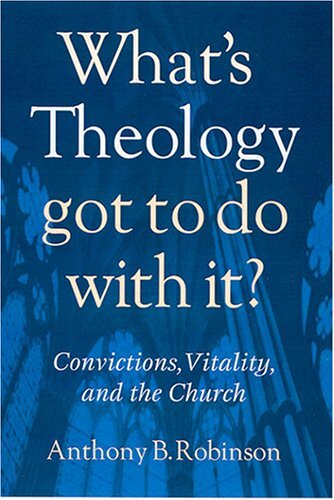Anthony B. Robinson, What’s Theology Got to Do with It?: Convictions, Vitality, and the Church. Alban Institute, 2006.
Referenced in: Pastoral Theology
LifeandLeadership.com Summary
This is a very popular book on “practical” theology among mainline Protestants. Even beyond those circles, Robinson popularized (though he did not introduce) terms such as “centered set” vs. “bounded set” or “open set” (his adaptation of set theory). Robinson’s essential thesis is “that an integral and absolutely vital relationship exists between our core convictions, our theology, and our health as a congregation.” He elaborates:
Where we are absolutely clear about our core convictions and their relevance to our life and purpose as church, chances of vitality are great. Conversely, where we are fuzzy about our core convictions and unsure of their meaning or value, disarray is likely. Organizations, like congregations, that lack norms and convictions and the ability to interpret their ongoing significance for their life and mission, are organizations that are likely to be ingrown, conflicted, and driven (often off the road and into the ditch) by personalities of leaders and members.” (4)
However, most congregations give little thought to theology (reflections on their understanding of core beliefs) regarding what they do as a church, believing theology to be the stodgy work of egg-headed nerdy types. This is unfortunate.
It has been said that most wrong ideas about religion trace back to wrong ideas about God. Robinson would agree, suggesting that congregations should be able to grasp a clear understanding of the Christian story, navigate responsibly through Scripture, and articulate bedrock Christian beliefs with special attention to the Trinity. They should then translate these beliefs into what it means to be a church (ecclesiology), engage in word and sacrament, and anticipate and live into God’s future (eschatology). In one sense, this is popular level apologetic on theology, defending the place of theology as it pertains to congregational health.
Here are a few of the more helpful observations. One is his adaptation of set theory in the chapter entitled “The Missing Center.” Here he draws the distinction between the open-set (“You can believe whatever you want here”) vs. bounded-set (very clear, tight boundaries). What he suggests is the centered-set that has a clear theological center to which everything gravitates, but either no boundaries (not my choice) or permeable boundaries (my preference). Another good piece is his high view of the place of Scripture in guiding theology, and the importance of biblical literacy. Evangelicals may not completely agree with Robinson’s views on the nature, origin, and authority of scripture, but will find rich observations on the use of Scripture in defining faith and practice. There is another good chapter on human sin, where he argues that churches with a weak theology of sin have a low view of conviction and confession, just as too high a view of sin leads to shame and hopelessness. He also discusses how we should understand sin as having both social and systemic dimensions but also emphasize personal aspects which lead to failures of character that mar the lives of individuals and congregations.
Although Robinson’s orientation bleeds through, a church leader from any theological tradition could read this book and be better resourced to both convince and equip their churches to theologize. It is also a good corrective for church leaders with overly pragmatic tendencies that either soft-pedal or push off theological concerns.
From the Publisher
Theology can be a loaded word for mainline Protestant congregations. It often suggests the dogmatic or implies fault lines for conflict. But when unleashed from its narrow academic sense, “theology” offers a powerful way to get at many of the issues that impact the health and vitality of congregations.
Anthony Robinson carefully defines theology as the “core convictions” that help members of a congregation understand their common perspective and shared identity. Theology is the foundational Christian experience, the wisdom that both forms and transforms lives. Rather than avoiding theology, congregations should openly express their beliefs and values to clarify their purpose, argues Robinson. Instead of trying to define the boundaries of belief, a “center-set” congregation will zero in on a reasonably clear core faith.
He examines the problems that occur when congregations are reluctant to focus on theology and are unsure of their beliefs. They risk having a weak identity with nothing at stake. They risk being little more than an exclusive social club. Absent core convictions, structure replaces Spirit, indirection replaces healthy dialogue, and agendas replace leadership.
Central to the book is the notion that Christianity is a revealed religion apart from our own personal preferences. The Bible as Scripture offers a doorway to God and a critical unifying narrative. The Trinity, as a powerful metaphor, provides a balanced approach to fulfilling a congregation’s purpose. Core convictions about God as creator, the person and work of Jesus, and the Holy Spirit are crucial to a congregational vitality.
Too many mainline Protestant churches are theologically “underfunded.” Congregations are strengthened when what they believe backs what they do. Indeed, theology, it turns out, has everything to do with it.
About the Author
Anthony B. (Tony) Robinson is President of Seattle-based Congregational Leadership Northwest. He speaks and writes, nationally and internationally, on religious life and leadership. He is the author of 10 books.
***For additional information on this resource, including reviews, click the bookstore links. Check the reference at page top or the links below for resource guides on related topics.***
See Other Resource Guides on Pastoral Theology:
- Minister Self-Care
- Ministry Burnout, Prevening and Overcoming
- Ministry Ethics
- Ministry Support Systems
- Strengthening and Renewing the Ministry Call
- Theology of Mission and Ministry
See Resources on Over 100 Ministry Topics:


